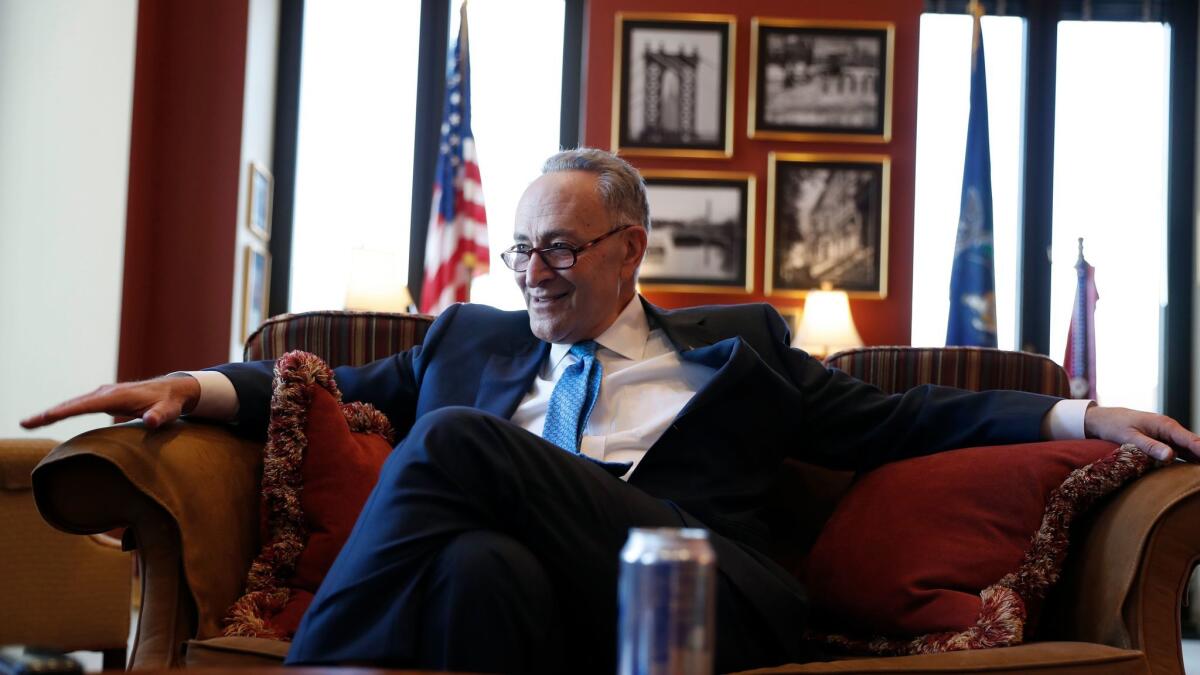Schumer calls for scrutiny of Wanda Group and other Chinese investors, noting China’s restrictions on U.S. films

Pressure is mounting on the U.S. government to more closely scrutinize China’s growing ownership of Hollywood’s film industry, this time thanks to a leading Democrat.
In a Wednesday letter, Senate Minority Leader-elect Charles E. Schumer (D-N.Y.) said China’s investments in U.S. industries, including film, deserve a more critical look from Washington regulators.
China’s protectionist policies, he said, have put American companies at a significant disadvantage in the world’s most populous country, even as Chinese companies like Dalian Wanda Group reap the benefits of the U.S.’ open market.
“I am concerned that these acquisitions reflect the strategic goals of China’s government and may not be receiving sufficient review,” Schumer wrote in his letter to Treasury Secretary Jack Lew and U.S. Trade Representative Michael Froman. “While China’s government has aggressively pursued policies that encourage strategic acquisition in the U.S., U.S. companies continue to face steep barriers to market access in China.”
The new letter echoes concerns raised earlier this year by lawmakers worried that China could use its investments in Hollywood to further its interests abroad by influencing American “soft-power” institutions in media and entertainment.
President-elect Donald Trump, who was copied on Schumer’s letter, has been highly critical of China and has floated the idea of imposing heavy tariffs on Chinese exports. Many expect the incoming administration to be more resistant to China investments in American companies, given the Republican businessman’s protectionist statements on trade while running for office.
At the center of the debate over Chinese investment is Wanda Group, the real estate and entertainment giant run by billionaire Wang Jianlin. Wanda, which has ties to the Chinese government, has been quickly building its Hollywood portfolio by gobbling up cinema giants like AMC Entertainment and Carmike Cinemas and production companies Legendary Entertainment and Dick Clark Productions.
Wanda declined to comment on the latest letter but has said recently that it will “continue to comply with all applicable U.S. laws in connection with its media and entertainment investments in the United States.” At a recent event in Los Angeles, Wang said his ambitions are motivated by business, not politics.
Schumer’s letter, first reported by the Wall Street Journal, highlighted Wanda and other China-Hollywood tie-ups as the most recent example of lopsided overseas business dealings. He decried the restrictions the Chinese government puts on the number of U.S. films shown in mainland theaters (34 foreign movies are allowed in China a year under a revenue-sharing program). Movies also must pass muster with government censors.
“We must guarantee that our companies have the opportunity to harness growth in international markets and expand to create more good paying jobs,” Schumer wrote. “U.S. companies should be able to compete with Chinese companies on a level playing field at home and abroad.”
Wanda is far from being the only Chinese player making deals with Hollywood studios and production companies. Major firms such as Jack Ma’s Alibaba Group, Tencent, and Huayi Bros. have made big investments in American entertainment ventures and movies.
Follow Ryan Faughnder on Twitter for more entertainment business coverage: @rfaughnder
More to Read
Inside the business of entertainment
The Wide Shot brings you news, analysis and insights on everything from streaming wars to production — and what it all means for the future.
You may occasionally receive promotional content from the Los Angeles Times.











